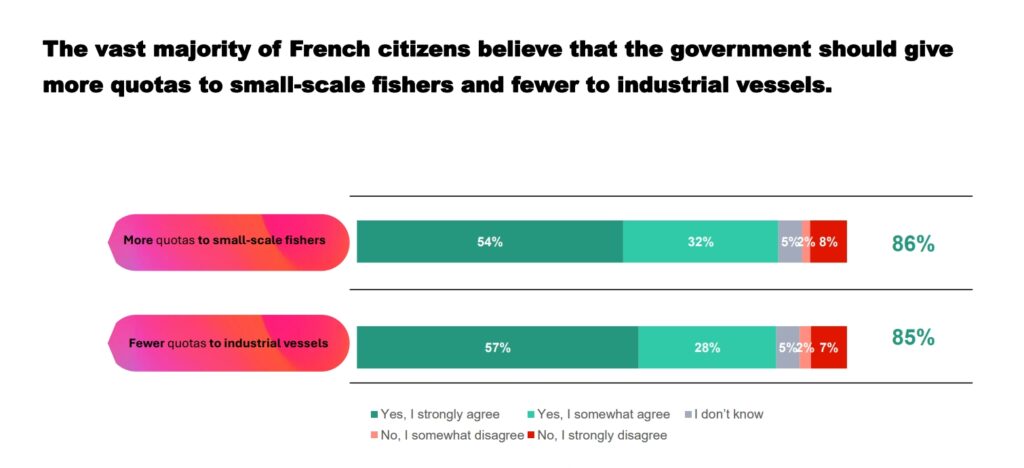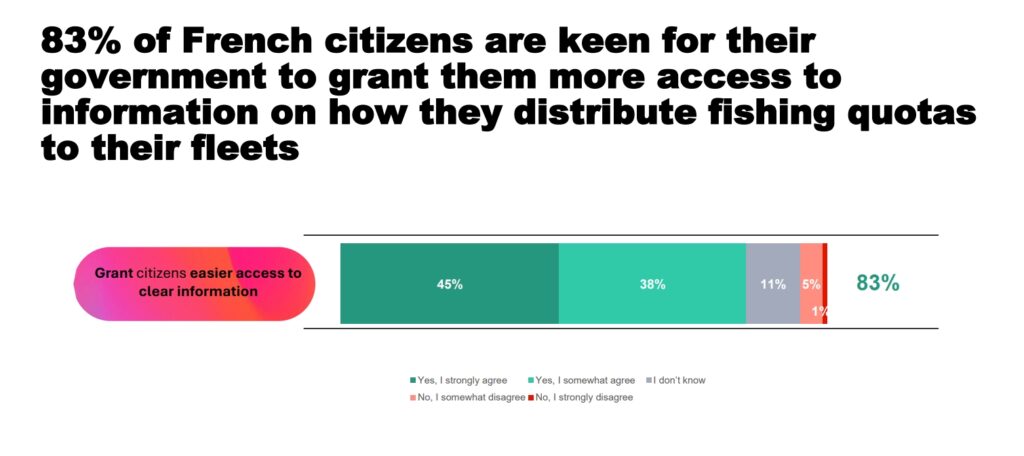86% of French citizens support more quotas for small-scale fishers, poll reveals
Press Release Date: September 17, 2025
Location:
Contact:
Emily Fairless | email: efairless@oceana.org | tel.: +32 478 038 490
Expanding France’s new pilot scheme for quota allocation would better align with its obligations under EU law
A vast majority of French citizens (86%) supports more quotas going to small-scale fishers and those using environmentally-friendly practices – an approach that would be in accordance with the EU’s Common Fisheries Policy. According to a new poll by YouGov published today, French people perceive the current allocation system as unfair and support greater transparency on how the government distributes fishing quotas. The release of these findings comes just ahead of Les Assises de la pêche et des produits de la mer – a key national forum taking place in Boulogne-sur-Mer on September 18-19 bringing together leaders from the public and private sectors to address the challenges facing the French fishing industry.
This year, France’s fisheries’ ministry (DGAMPA) is testing a pilot project that increases the weighting of environmental and socio-economic criteria on a small share (less than 2%) of national quotas, whilst reducing the weighting of past catch history. Current practice sees France predominantly allocating fishing opportunities to its fleet based on past catch history (how much fish a vessel has previously caught), largely disregarding social and environmental criteria. This current system tends to favour industrial over small-scale vessels and goes against France’s obligations under the EU’s Common Fisheries Policy [1].
Vera Coelho, Deputy Vice President at Oceana in Europe, said: “France’s pilot project marks an important step towards a fairer allocation system. France should now extend this approach to all quotas, progressively increasing the weighting in favour of job creation and of fishing practices with a minimal impact on the marine environment, while reducing the dominance of past catch history. Opening a public consultation on quota allocation would provide a perfect opportunity to achieve this. Such a transition would be better aligned with citizens’ expectations and with the objectives of the Common Fisheries Policy.”
Small-scale fishers in France represent around 70% of the fleet, account for half of employment in the sector, and are vital to local economies. However, despite their important contribution to coastal communities and generally lower environmental impact, small-scale fishers catch just one fifth of the total fish compared to industrial fishers.
The poll – conducted in April this year on a sample of 1000 respondents – found that 86% of French citizens want their government to give more fishing quotas to small-scale fishers, whilst 85% favour fewer quotas for industrial vessels. Respondents to the poll stated that they valued the importance of protecting local jobs (82%), providing fresh, local seafood (82%), and minimizing harm to the ocean (80%). Indeed, 86% believe that destructive and unselective fishing methods are incompatible with a healthy ocean. These results are comparable to a similar poll conducted in Spain.

“Revising how quota is allocated in France and throughout the EU is not only a matter of ensuring fair access to resources for already vulnerable small-scale fishers – it is also a crucial step for their survival,” said Gwen Pennarun, President of the Low Impact Fishers of Europe (LIFE). “The French government must create a system that rewards those who fish with a lower environmental impact and who contribute significantly to the social well-being of communities. In so doing, France must support a gradual, well-planned transition and create genuine incentives for achieving sustainable fisheries.”
Transparency is also a key concern, with 83% of those polled keen for their government to be more transparent about how it allocates fishing quotas. Additionally, 83% believe that small-scale fishers should play a bigger role in the decision-making process for quota allocation. Small-scale operators fish in coastal waters with boats less than 12 metres long, whereas industrial operators have larger vessels and often tow gear out at sea.

Note to editors:
[1] Article 17 of the Common Fisheries Policy legally requires countries to use transparent and objective criteria when allocating fishing opportunities, including those of an environmental, social, and economic nature.

